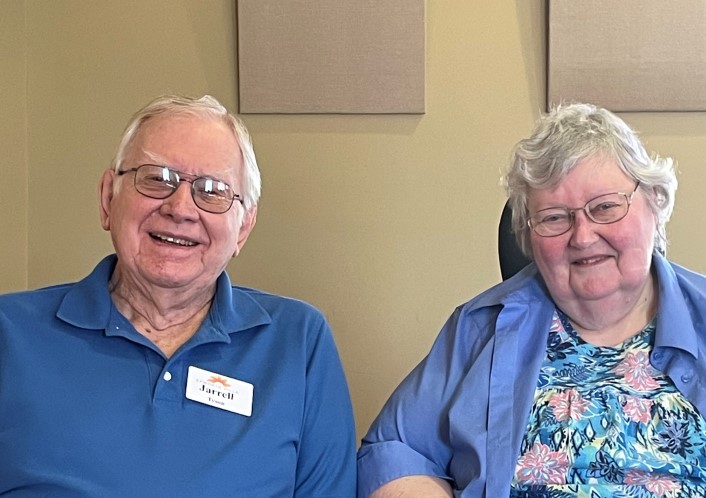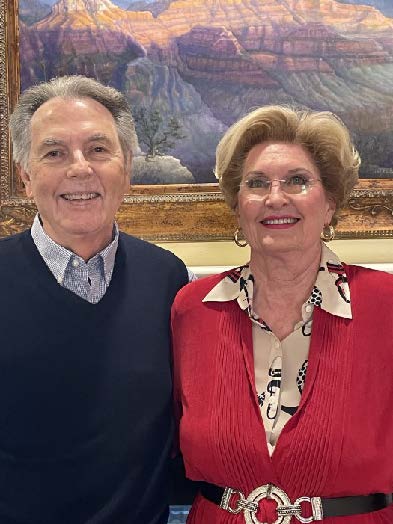Author: Beth Case
Joy in the Morning with Pastor Laura!
Mardi Gras Fun!!!
Kindness as a Spiritual Value – by Gene Spillman

Kindness is part of Lenten discipline. Spiritual values became important to me when I began looking for a way that I could discipline myself and begin practicing the deepest spiritual values of the Christian faith.
It was not long until I discovered Galatians 5:22-23. It is titled the “Fruits of the Spirit.” “By contrast, the fruit of the Spirit is love, joy, peace, patience, kindness, generosity, faithfulness, gentleness, and self-control. There is no law against such things.” (NRSV)
I began to look at these nine gifts one by one. What I found in my study of kindness is a closeness to God. Consider with me, Kindness — being friendly, generous, and considerate.
Kindness is a very personal habit and characteristic that makes one attractive to others as a friend. As we cultivate this characteristic, we find persons are attracted to us; however, kindness is more than just making friends. Kindness includes the above characteristics.
How do we be friendly? The Golden Rule might help! “Do unto others as you would have them do unto you.” Think of the way you act when out and about in the community and in the community at large. Is road rage a reaction? Or, do you step back and give someone else your place in line if it would be of help to someone? Are you pleasant to the checkout person – the stocker?
Feel the presence of God when you share kindness in your life. In this season of Lent, will you continue to develop in your life the discipline of kindness and all of the other “Fruits of the Spirit?”
Joy in the Morning with Pastor Laura!
Join us for a special time of prayer for peace.
Christian Kindness and Lent – by Don Frost
During the 40 days of Lent, we have been challenged to perform daily acts of kindness. This is a marvelous idea and one that is worthy of pursuit; however, should we not be living a life every day that is centered on being kind to others, especially those who struggle with living in economic, emotional, social, or spiritual poverty?
One of our main objectives as a “Christian” is to strive to become more and more like our Lord, Jesus. We walk this road by daily taking on His mantle, living as He lived. One of the characteristics of His life was to be kind, to exhibit lovingkindness. Throughout Scriptures, this is expressed in two ways.
The first is God expressing His lovingkindness for His people, you and me. His lovingkindness is displayed in passages such as, “… with everlasting kindness, I will have compassion on you.” (Isa 54:8, NIV); “… I am the Lord who exercises lovingkindness…” (Jer 9:24, NIV); “…He has shown kindness by giving you rain from heaven and crops in their seasons…” (Act 14:17 NIV). Our Lord is kind to us as His provisions for us substantiate.
The second way the Scriptures describe kindness is for God’s people to be kind-hearted, to exhibit kindness to others be they our friends, our enemies, those who are wealthy, or those who are poor; regardless of their circumstances in life, treat them with kindness. Why? Because in the Scriptures we are commanded to and are given instructions on how to express kindness. His direction to us is recorded in passages such as, “Be kind and compassionate to one another…” (Eph 4:32 NIV); “And the Lord’s serv-ant … he must be kind to everyone…” (2 Tim 2:24 NIV). In other passages, the Bible expressly tells the Christian to show kindness to the poor, the needy, the oppressed, and one another.
Here at Epworth Villa, we live in a world that longs for expressions of kindness, and this 40-day challenge should be just the start. We should at all times through our days intentionally look for opportunities to show lovingkindness: a note or word of encouragement; a smile and pleasant greeting; an offer to assist; a phone call. There are many ways we can respond to the Lord’s direction and the Holy Spirit’s inner nudging. Don’t let an opportunity to brighten someone’s day pass you by.
But you know what; having talked about our Lord’s expressions of His lovingkindness and His direction to His people, we have yet to consider the greatest act of loving-kindness this world has ever seen; and that is the Crucifixion of Jesus, God’s one and only Son. It is this act of lovingkindness that provided the way for sinners like you and me to be forgiven of our sins and to have eternal life. Loving-kindness cannot be expressed in any greater, more compassionate way than that, and that is why we celebrate this Easter blessing. HE IS RISEN!!!!!! — Don Frost
Joy in the Morning with Pastor Laura!
My Heart at Thy Sweet Voice -by Natalie Tyson
Mention the words “Valentine’s Day,” and we conjure up images of love and romance — maybe Cupid (Eros), the Greek god of love, or a heart, long linked to strong emotions, like love. But why the name, and why February 14? Legends give us some interesting theories. The Roman St. Valentine, for whom the day is reportedly named, was put to death possibly on February 14, c. AD 270, allegedly for helping Christians escape harsh Roman prisons. The added love story is that the imprisoned Valentine sent the first “valentine” greeting himself after he fell in love with his jailor’s young daughter, whom he had befriended and healed from blindness. Before his death, he supposedly wrote her a letter signed “From your Valentine,” an expression still used today. Because of his sympathetic, heroic, and romantic reputation, Valentine had become one of the most popular saints in England and France by the Middle Ages. Valentine’s Day is now celebrated in France, the United Kingdom, Canada, Australia, Mexico, and the U.S.
Another story claims the Christian church may have chosen mid-February for St. Valentine’s feast day to “Christianize” Lupercalia, a Roman fertility festival celebrated on February 15. In the Middle Ages, the day became definitively associated with love. The French and English believed that February 14 was the beginning of birds’ mating season, suggesting Valentine’s Day should be a day for romance.

We use the word love usually to indicate affection or deep feelings. Add a bit of excitement and mystery, and you have romance! I know Jarrell loves me; he kisses me morning and night, no matter how old, disheveled, or cranky I am. Romance? He’s surprised me with: a harp-shaped cake he made himself; his own poetry; jewelry; what’s become my favorite sweatshirt (and he’s colorblind); and adventures in foreign countries. What first attracted me to my husband was his voice. Even now, hearing his voice still warms my heart.
Wes Howl’s joyful, waltz-tempo rendering of “Love Lifted Me” during a recent Vespers reminded me that God’s love for us underscores the love we have for each other. Love has been part of God’s world since Adam. God knew Adam needed a woman; adding Eve set the stage for couples from Day 8 (or so). The Bible tells of many successful marriages, and one can find plenty of romance, especially in Solomon’s Song of Songs. 1 Corinthians 13:4-7 gives us a great recipe for a good marriage: “Love is patient, love is kind…” Philippians 2:3 adds to it. “Do nothing out of selfish ambition or vain conceit. Rather, in humility value others above yourselves.” Ephesians 4:2 tells us to “Be completely humble and gentle; be patient, bearing with one another in love.” I’m still trying.
A Love Story: Jan and Richard
by Jan J. Smith
Richard and I met at John Marshall when I was 15 and Richard was 16. We were pretty much oppo-sites. Richard wore a black leather jacket and blue suede shoes, rode a motor scooter, was a SCUBA diver, loved classical music & jazz, won a city-wide science fair competition, and had a pilot’s license. Despite being focused on having a good time, Richard knew he was going to be a doctor. I was a class leader, yearbook queen, cheerleader, in honor society, liked rock-n-roll music, didn’t like beer and cigarettes, and was planning to become a teacher. I usually dated the athletes, so by contrast, Richard was the most interesting and exciting man I had ever dated! Our dates included water skiing, fishing, flying, attending the symphony, and going to the movies. We continued dating through college and married after I graduated from OSU with a teaching degree and Richard completed his first year of medical school. I taught school putting Richard through medical school.

Richard became a workaholic, obsessed with his work as a neurosurgeon. I was very busy raising 3 active boys, in Bible studies, women’s groups, taught tole painting and developed a successful ladies’ belts business. These activities gave me a sense of importance that wasn’t being supplied by my “too busy with his practice” husband. But we were growing apart, living parallel lives, and were also spiritually separated. Richard had only a vague belief in God and thought if he could learn just enough, he would find the meaning of life and happiness. I discovered I had made Jesus the savior of my life, but not the Lord of my life. Now I trusted God and gave the Holy Spirit full control.
I learned I was not on Richard’s team. In fact, being a first-born, I had my own team, and I wanted to win. So, I quit trying to change Richard and accepted him the way he was. I claimed I Peter 3:1 (TPT), “Be devoted to your own husbands, so that even if some of them do not obey the Word of God, your kind conduct may win them over without your saying a thing.” Richard noticed my attitude toward him had changed. I made sure he was the family leader. When disagreements came, I strongly expressed my thoughts but surrendered the final say to Richard. He began to understand the responsibility of his final decision. I stopped “nagging” Richard, made sure our home was a safe, happy place to be, and gave him the respect that all men desire. Richard started noticing acceptance, admiration, and appreciation from me. I began telling him all the nice things I thought about him and looked for ways to please him. I was treating Richard like a king, and he began to want to treat me like a queen.
I began to share with other women and wrote and taught “Marriage Enrichment” courses. God changed me into the woman He wanted me to be so I could love Richard into the man God wanted him to be. Richard wanted the joy he saw in my life and finally, after praying 14 years for Richard, he gave his life to Christ. Women relate by talking, so Richard learned to concentrate on eye-to-eye contact as we openly communicated. He learned to express sympathy
and understanding rather than a solution to the problem unless asked. He changed from saying, “Aren’t you ready yet?” to “I’m ready when you’re ready.” Everyone needs physical touch, so we started holding hands a lot, even in church. Richard began verbalizing his love with lots of “I love you” along with lots of affection, romance, compliments,
helping with the dishes, bringing me flowers, and stopping at antique stores with me. I attentively listen to the frustrations of Richard’s day, believe in him, give him encouragement, and put love notes in his luggage when he goes out of town. I realized men relate by doing things together, so I joined Richard in activities of motorcycle riding, Stearman biplane flying, and motor coaching. We carve out fun, relational things to do together as a couple.
Another vital thing we learned to do is to pray together, out loud. At first, verbal prayer felt too personal and uncomfortable; but now with verbal prayer, we experience the joy of amazing closeness between ourselves and God. Praying together is a powerful experience and is the “cord of three strands” keeping us tightly bonded. Never underestimate the power of God in your life or your marriage!





